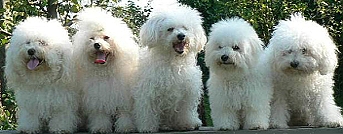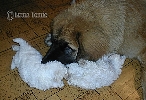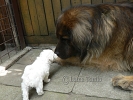|
|
SOCIALIZING YOUR PUPPY
Socialization means learning to be part of society. When we talk about socializing pet puppies, it means helping them learn to be comfortable as a pet within human society—a society that includes many different types of people, environments, buildings, sights, noises, smells, animals and other dogs.
Most young animals, including dogs, are naturally made to be able to get used to the everyday things they encounter in their environment—until they reach a certain age. When they reach that age, they are naturally made to become much more suspicious of things they haven’t yet experienced. Mother Nature is smart! This age-specific natural development lets a young puppy get comfortable with the everyday sights, sounds, people and animals that will be a part of his life. It ensures that he doesn’t spend his life jumping in fright at every blowing leaf or bird song. The later suspicion they develop in later puppyhood also ensures that he does react with a healthy dose of caution to new things that could truly be dangerous.
What Age Is Best for Puppy Socialization?
Puppies are most accepting of new experiences between 3 and 12 weeks old. After that age, they become much more cautious of anything they haven’t yet encountered. From about 12 to 18 weeks old the opportunity to easily socialize the puppy ends—and with each passing week it becomes harder to get the pup to accept and enjoy something that he’s initially wary of. After 18 weeks old, it’s extremely difficult, and sometimes impossible, to teach a dog to like something new, or help him become comfortable with something he finds frightening.
Why Is Puppy Socialization Important?
Well-socialized puppies usually develop into safer, more relaxed and enjoyable pet dogs. This is because they’re more comfortable in a wider variety of situations than poorly socialized dogs, so they’re less likely to behave fearfully or aggressively when faced with something new. Poorly socialized dogs are much more likely to react with fear or aggression to unfamiliar people, dogs and experiences. Dogs who are relaxed about honking horns, cats, cyclists, veterinary examinations, crowds and long stairwells are easier and safer to live with than dogs who find these situations threatening. Well-socialized dogs also live much more relaxed, peaceful and happy lives than dogs who are constantly stressed out by their environment.
Socialization isn’t an “all or nothing” project. You can socialize a puppy a bit, a lot, or a whole lot. The wider the range of experiences you expose him to, the better his chances are of being comfortable in a wide variety of situations as an adult.
How Does a Puppy Need to Be Socialized?
Socialization is a big project. It requires exposure to the types of people, animals, places, sounds and experiences that you expect your dog to be comfortable in later in life. Depending on the lifestyle you have planned for your dog, this might include the sight and sound of trains, garbage trucks, schoolyards of screaming children, crowds, cats, livestock or crying infants. While it’s impossible to expose a young puppy to absolutely everything he will ever encounter in life, the more bases that you cover during the peak socialization period of 3 to 12 weeks, the more likely the puppy will be able to generalize from his prior experiences and find something reassuringly familiar in a new situation. For any pet dog, it’s essential to get him used to the common types of people, dogs, sights, sounds and physical handling and grooming that will be a sure part of his daily life.
Do I Need to Do Anything Special When I Socialize My Puppy?
Yes! You need to make sure that the situation is not overwhelming for him, and that he becomes more comfortable—not more worried—each time you expose him to something. For instance, maybe you’ve planned a puppy party where a group of people will gather to help you socialize your puppy right at home. But some puppies can be overwhelmed by meeting a bunch of strangers all at once. Even though your intentions are good, if your puppy is cowering in the corner at his own party, then he’s not learning anything good about strangers! The rule of thumb with puppy socialization is to keep a close eye on your puppy’s reaction to whatever you expose him to so that you can tone things down if your pup seems at all frightened. Always follow up a socialization experience with praise, petting, a fun game or a special treat.
What If My Puppy Seems Frightened During Socialization?
Even though 3 to 12 weeks old is a time when puppies are most comfortable with new experiences, they might sometimes find a new experience frightening. Whenever this happens, it’s important to introduce your puppy to the scary situation much more gradually, and to make a big effort to do something your puppy loves during the situation or right afterwards. For example, if your puppy seems to be frightened while sitting on your lap in a schoolyard full of children, then sit further away from the action and offer your pup a delicious treat each time a scary noise or movement happens. Another solution is to go to a much quieter park where only a few children are playing, use praise and treats to help convince him it’s a great place to be, and then over days or even weeks of your socialization sessions, gradually approach a schoolyard again once he’s started to like the sights and sounds of active children.
Puppy Classes
One great way to help socialize a puppy is to attend puppy kindergarten classes. These are classes designed especially for puppy training and early socialization. In a typical puppy class, off-leash play and play-fighting helps socialize puppies with each other, teaches them to be gentle with their mouthing and biting, and gets them used to being handled by a variety of people. Some classes even include exposure to odd sights and sounds using props, CDs of sounds, and theatrics with costumes to accustom the puppies to a wide range of life experiences. Puppy classes also teach some basic obedience skills, so on top of the socialization component, you’ll learn how to ask your pup to comply with your requests and behave according to your expectations.
Final Remarks
Socialization is essential for helping your puppy develop into a happy, fun and safe companion. Most people find it easier and more enjoyable to live with a dog who’s relaxed with strangers, gets along well with dogs and adapts easily to new experiences. While some dogs are born with genetic predispositions that can make this difficult or impossible, most dogs are very impressionable when young and can learn to take everything in stride. Socializing your puppy gives him the greatest chance possible to develop into a dog who’s comfortable in his environment and a joy to be with.
![]()
Kontakt +420 606 356 579, email: lumatomio@gmail.com
Chovatelská stanice boloňských psíků © Luma Tomio 1997 Marie Lupačová
Veškeré fotografie, obrázky, design a obsah stránek jsou ve vlastnictví chovatelské stanice Luma Tomio nebo jiných autorů, a jsou chráněny autorským zákonem.
Jejich kopírování a plagiátorství je bez předchozího souhlasu zakázáno.Všechna práva vyhrazena. Autor stránek: Marie Lupačová
All photos, pictures, design and
content pages are owned kennel Luma Tomio or other authors, and are
protected by copyright law.
Their copying and plagiarism is prohibited without prior consent.
All rights are reserved. Author web site: Marie Lupačová



